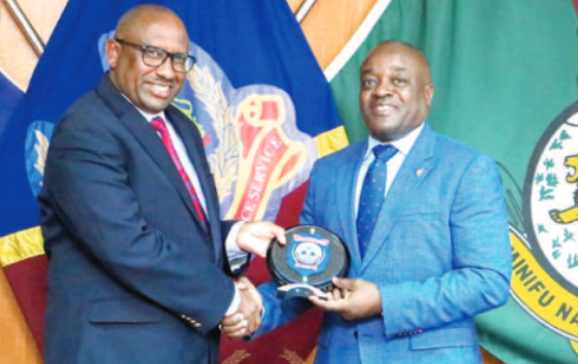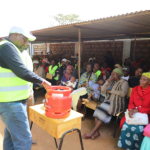The deployment of Kenyan police officers to Haiti for a multi-national security support mission has faced numerous challenges but is now set to proceed. Scheduled to leave next Sunday, the officers have undergone extensive training to address the escalating violence and lawlessness in Haiti, where gangs have overwhelmed the local police force.
The deployment comes at a crucial time, coinciding with President William Ruto’s state visit to the United States. The Kenyan forces will operate from living quarters built by US civilian contractors, underscoring the international cooperation involved in this mission.
This is an opportunity to put Kenya in the global arena as a nation that does noble things, said government spokesperson Isaac Mwaura, who confirmed the planned deployment.
“We are committed to honouring our international obligations as a government and a nation,” Mwaura said The deployment will coincide with Pres-identWilliam Ruto’s three-day state visit to the United States to discuss several issues, including trade, investment, regional security, and the Haiti mission.
Haiti’s security situation has deteriorated significantly, with rampant crime and violence affecting millions of people. The Kenya-led force aims to support the local police, who are understaffed and ill-equipped to handle the challenges they face. This assistance includes joint security operations and securing critical infrastructure sites.
Comprising specialized units from Kenya’s General Service Unit and Administration Police, the force is prepared to use robust measures to disarm and neutralize gangs, as authorized under Chapter VII of the UN Charter. Despite opposition and legal hurdles, the Kenyan government has addressed concerns raised and is committed to fulfilling its international obligations.
In a previous briefing, UN Secretary General General Antoniontonio Guterres confirmed that the Kenyan team will, if need be, be expected to use robust force to disarm and neutralise the gangs in order to restore order.
In an earlier interview, Inspector General of Police Japhet Koome also expressed optimism for the mission.
“We will lead this mission. We have never failed. We will succeed there too,” he said. The mission has suffered major setbacks since it was approved in October last year. The High Court, in blocking the deployment, raised several issues, but Interior Cabinet Secretary Kithure Kindiki said they had all been addressed. Laws and enforcement measures, such as detention and arrests, had been finalised, he said.
The US Congress, among others, has expressed reservations about the deployment, citing human rights concerns and the lack of clear objectives. However, the urgent need to restore stability in Haiti and protect its civilian population underscores the importance of this mission.
“With the absence of clear objectives for this MSS mission, we strongly believe that funding this security operation in tandem with continued support for the de facto Haitian authorities is a misguided strategy that may have catastrophic repercussions for the Haitian people,” the Congress warned. Insecurity in Haiti escalated after the July 2021 assassination of President Tovenel Moise.
Former Prime Minister Ariel Henry took over after Moise’s death but was later forced to resign. In 2022, Henry urged nations to step forward and intervene, including to address the then-gang-led blockade of fuel terminals and humanitarian aid.
Other countries and Guterres accepted the request. In July last year, during a visit to Port-au-Prince, Guterres noted the seriousness of the situation, saying it demanded their urgent and sustained attention.
“We must put the victims and the civilian population at the centre of our concerns and priorities. If we do not act now, instability and violence will have a lasting impact on generations of Haitians,” he said. In early March this year, Henry travelled to Kenya but the gangs took control of the streets of Port-au-Prince, calling for his resignation while he was away, leaving him stranded in the US territory of Puerto Rico. An alliance of gangs is led by Jimmy “Bar-becue” Cherizier, a former police officer.
The resignation of former Haitian Prime Minister Ariel Henry on March 11 followed pressure from gangs and paved the way for a transitional authority. This occurred shortly after a meeting of regional leaders in Jamaica, attended by US Secretary of State Antony Blinken.
The forces being deployed to Haiti will provide support to the Haiti National Police (HNP), which was established in 1995 to enhance public security under civilian control. Previously part of the Haitian army since 1912, the HNP faces challenges such as militarism, factionalism, and corruption, leading to its perception by citizens as repressive.
With an official force of 15,498 police officers, including only 1,711 women, the actual number of effective officers is likely lower. To bolster the HNP’s efforts, the US has pledged $100 million (approximately Sh14.5 billion) for the mission. This support encompasses logistics, intelligence, communication, and medical assistance.
US President Joe Biden reaffirmed this commitment on September 23, emphasizing the importance of ensuring the success of the mission. By providing comprehensive support, the US aims to contribute to stabilizing Haiti and improving security conditions for its citizens.



